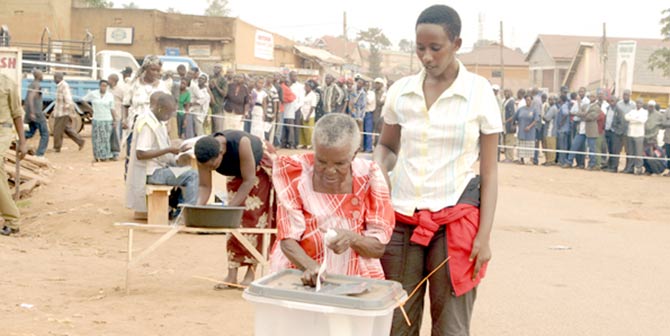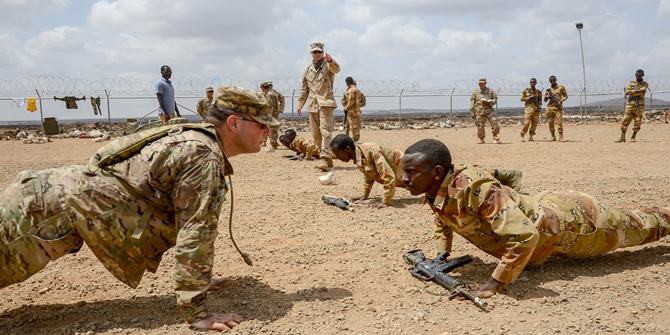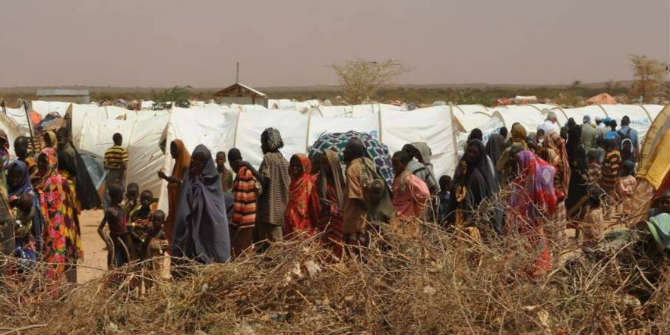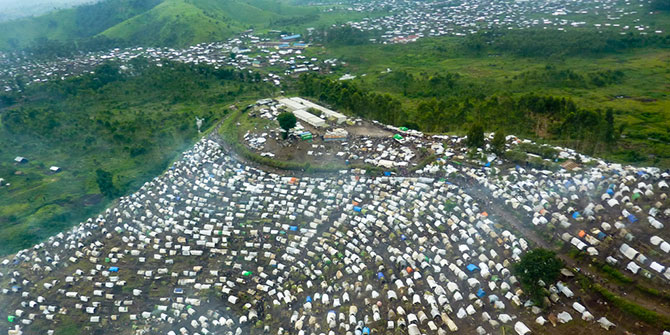Pat Stys and Tom Kirk discuss the challenges of designing a new research project examining water governance in Goma, the Democratic Republic of the Congo.
This article is part of the #PublicAuthority blog series, part of the ESRC-funded Centre for Public Authority and International Development.
In early 2018, Mercy Corps DRC representatives approached LSE CPAID researcher Pat Stys to conduct research on an ongoing WASH programme in Goma. Currently, three quarters of the Democratic Republic of the Congo’s (DRC) population lack access to clean drinking water. Alongside disease, the burden of collecting water from distant government-run taps often falls to children and women. Furthermore, when these taps fail, households can be forced to turn to expensive ‘water mafias’ that monopolise supplies trucked in from Lake Kivu and unpotable collected rain or lake water. The sporadic nature of water services and fluctuating prices mean that many families live with a high level of uncertainty concerning this most basic of needs.
To address this, Mercy Corps instigated the IMAGINE programme in 2008. It aims to rehabilitate and extend Goma’s municipal water systems, and to embed a new water management protocol for 49 tap stands. The programme leverages laws that came into effect in 2015 and a public-private partnership between a new Congolese company called Congo Maji Sarl, REGIDESO, the DRC’s parastatal water utility company, and provincial authorities. IMAGINE has also recently expanded its programme to Bukavu.

Image Credit: Keith Samuel Muhindo Balume
Mercy Corps’ research agenda sets the broad tasks of understanding patterns of water use among Goma’s residents, the impact of the programme on household finances, and the evolution of IMAGINE’s model. LSE researcher Pat Stys put together a team of researchers from CPAID and together we designed methodologies to provide insights into these broad questions while also fitting with CPAID’s interests in the nature of public authority, particularly in places where key services are not always completely governed or delivered by the ‘state’. This meant looking for ways of gaining both an intimate understandings of households’ daily struggles to access water and of seeing them within their wider socioeconomic contexts.
Inspired by others’ work with financial and governance diaries, and influenced by Pat’s grounding in Social Network Research, we aim to see if these methods can complement one another. We are also including an ethnographic component to further understand the day-to-day dynamics of Goma’s tap stands. Together, the three components will be used to examine the lives of 24 households of low and middle socioeconomic status across three research sites on a bi-weekly basis for nine months. Semi-structured interviews and participatory power mapping exercises, drawing on participant-aided sociograms, will be conducted during researchers’ visits.
The collected data will be assessed in as near to ‘real-time’ as possible, with interview questions iterated, and social network analyses periodically undertaken. We hope that the combination of in-depth financial data, iterated interview questions, and network analyses will permit us to research, contextualise, and understand how households manage their needs in an environment characterised by uncertainty and insecurity, and how IMAGINE may be contributing to this management.
However, long before data collection began, Tom, Pat, Papy, and Samuel met to hash out the basics. This meant grounding the research tools in local understandings of poverty and insecurity, and ensuring our research questions capture how households understand the management of what some have called their ‘financial portfolios’. As needless as it is essential to emphasise, our proposed methodological approaches and current understandings were quickly (and fairly abruptly) revealed as fairly naïve and unrefined by Papy and Samuel, both of whom have conducted social network research as well as longitudinal data collection in the DRC, both as part of their university courses and as professional researchers.
We realised that it is likely that everyone in Goma has some access to water. Rather, it is the cost in terms of time and money, as well as exposure to insecurity that we should expect to vary widely, especially across those of different socioeconomic status. Likewise, we now understand that household incomes are painfully irregular and variable, based on short-term contracted work and multiple part-time employments in haphazard and unpredictable combinations and durations. Most importantly, we can expect household financial governance, or management, to be equally ruled by exchanges of favours, obligations, and promises, many of which a simple accounting exercise would not capture.
It was also revealed that we need time to establish trust and confidence with the participating households. No one will disclose their cheque book’s details at a first, or even a twelfth, meeting, especially when their financial lives are this precarious and mixed with non-cash assets, favours, or networks. Indeed, the importance of building trust with our participants was repeatedly emphasised by Papy and Samuel, forcing us to rethink our timelines and approaches.
Nonetheless, we are up for the challenge, and thrilled to be working with such a strong core research team that harbours no qualms in challenging each other and the theories and assumptions on which we ground our approaches. Their refinements to the methodology and approach will make the project, while our misperceptions and misconceptions could have broken it. This is but another testament to the need for multi-national team approaches to research projects.
Together, we have refined (schooled) each other and designed a novel methodology to inform our longitudinal data collection concerning household financial governance, water access and use, and the IMAGINE model. As CPAID researchers working with Mercy Corps DRC we hope that our research, results, and conclusions shed light on not only aspects of successful – and not – water governance approaches, but also inform future refinements and applications of the models in Bukavu and beyond.
The project is jointly funded by the Centre for Public Authority and International Development (CPAID) and Mercy Corps, with data collection starting in late 2018. Batumike Papy Muzuri, Keith Samuel Muhindo Balume, Joe Trapido, Duncan Green, Tom and Pat make up the core research team.
Read more about #PublicAuthority and visit our website.
Patrycja Stys (@pat_stys) is a Research Officer in the Centre for Public Authority and International Development (CPAID) at LSE.
Thomas Kirk is a researcher and consultant based at LSE. His research interests include the provision of security and justice in conflict-affected regions, social accountability, civil society, local governance and public authority.
The views expressed in this post are those of the author and in no way reflect those of the Africa at LSE blog, the Firoz Lalji Centre for Africa or the London School of Economics and Political Science.





